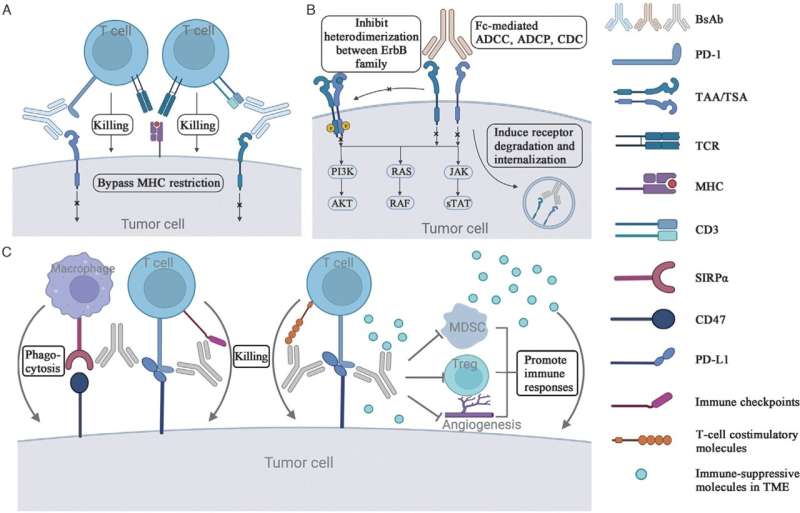This article has been reviewed according to Science X's editorial process and policies. Editors have highlighted the following attributes while ensuring the content's credibility:
fact-checked
proofread
How bispecific antibodies could bring new hope to patients with lung cancer

Antibodies are proteins produced by our immune system, that protect us from foreign antigens that enter our body. These bind to antigens through epitopes, i.e., binding sites on antigens, to subsequently eliminate them. Generally, an antibody only binds to one antigen via an epitope.
However, recent technological advances enable antibodies to target two different antigens by binding to two sites. These antibodies, aptly termed bispecific antibodies (bsAbs), have recently emerged as an important therapeutic strategy for the treatment of cancer and immune diseases.
Notably, BsAbs are known to outperform monoclonal antibodies (MoAbs), since they have relatively broader applications and higher antitumor effects. A number of bsAbs have been evaluated in clinical trials, and one—amivantamab—has been approved for the treatment of lung cancer. With ongoing advances in antibody engineering and recombinant DNA technology, there is a steady increase in novel strategies for the generation of effective bsAbs.
A recent review article published by a team of researchers from Tongji University and Fudan University in China, describes the mechanisms of action of bsAbs and their potency in ongoing clinical trials for lung cancer treatment.
This review was led by Professor Shengxiang Ren from Shanghai Pulmonary Hospital, Tongji University, and was published in the Chinese Medical Journal. Discussing the motivation behind this article, Prof. Ren says, "The clinical utilization of bsAbs might widen the landscape of treatment and serve as an important arsenal for patients with lung cancer."
First, the article explores how bsAbs increase cytotoxicity against cancerous cells by hindering the process through which these cells avoid immune detection. Next, they connect T cells (a type of immune cell) and tumor cells by bridging them together, which leads to T cells recognizing and eliminating tumor cells.
This class of bsAbs is also referred to as bispecific T-cell engagers (BiTEs). In addition, bsAbs enhance immune response towards for tumor clearance by simultaneously blocking two cell signaling pathways or molecules that suppress the immune system.
Further, the research team summarized key findings on bsAbs that are being evaluated in phase I–III clinical trials for the treatment of lung cancer. These include amivantamab developed by Janssen Biotech, zenocutuzumab developed by Merus, SI-B001 developed by Sichuan Baili Pharmaceutical, KN026 developed by Alphamab Oncology, IBI315 developed by Innovent Biologics, AK104 developed by Akesobio, and SHR-1701 developed by Jiangsu HengRui Medicine.
In 2021, amivantamab was conditionally approved for lung cancer with EGFR exon 20 mutation by the Food and Drug Administration (FDA). Meanwhile, the drug has demonstrated effectiveness in the treatment of patients with lung cancer, particularly those who were resistant to the drug osimertinib.
The clinical trial "CHRYSALIS-2" is currently evaluating the efficacy of a combination of amivantamab and lazertinib in the treatment of lung cancer, with the results being updated at the American Society of Clinical Oncology (ASCO). The team also discussed new potential targets for bsAbs, BiTEs, and multispecific antibodies, which have demonstrated promising preclinical results and are currently in phase I/II trials.
Despite these advances, the therapeutic use of bsAbs in lung cancer faces several challenges. These include delivering bsAbs to solid tumors and across the blood-brain barrier, expanding the therapeutic window, minimizing adverse effects, and reducing off-target toxicity. A well-designed clinical trial is critical to draw accurate conclusions.
However, because bsAbs are complex and unique, it is advisable to carefully determine the initial drug dose as well as the rate of dose escalation of bsAbs. An ideal bsAb dosing strategy should consider both pharmacological and toxicological parameters. Additional research into target selection, structure optimization, biomarker identification, and combinatorial therapies is also warranted.
In conclusion, Prof. Ren states, "Compared with conventional antitumor drugs, the bsAbs provide precise targeting and enhanced target-binding abilities. Therefore, they might increase antitumor activity, reduce adverse effects, and lead to reduced treatment costs compared with monotherapy or combination strategies."
More information: Wanying Wang et al, Current status and future perspectives of bispecific antibodies in the treatment of lung cancer, Chinese Medical Journal (2023). DOI: 10.1097/CM9.0000000000002460



















